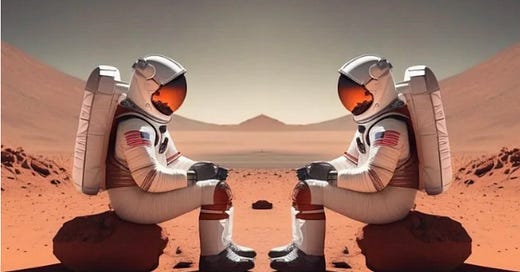A dialectic is a dialogue between two people with opposing points of view. The process helps to discover the truth of an issue, establishing what the differences are and thereby work a way through the opposing positions.
Hegel and Marx morphed the dialectic into a method of ironing out internal contradictions. Rather just a conversation between people to help establish truth, it became a philosophical technique to develop new ideas.
Hegel’s conception of the dialectic took the thesis and the antithesis, merging them together into a synthesis. While Marx moved the process from the meta-physical to the material realm.
After seeing the pain and suffering caused by the Marxian dialectic in the 20th Century, I am naturally cautious of the Modern dialectic process.
AngloFuturism has Hegelian dialectic tendencies. It is the synthesis of the pre-Modern past and the technological future. These are opposing ideas, which exist at the extremes.
The initial memes associated with AngloFuturism primarily encouraged the building of very large infrastructure projects, bombastic architecture and even a hyper-technological future. This synthesis could easily fall into nationalistic tropes. Which we saw in the 20th Century, where Futurism was used with great effect in Italy.
So rather than blindly adopting the Hegelian or Marxism dialectic approach, what about adopting a different way to synthesise AngloFuturism. Rather than merging them, treating the thesis and antithesis as equals, why not say the Anglo takes on the meta-physical role and Futurism takes on the physical? So they work synthesise them together in a particular way. Not haphazard, but ordered.
An example could be like a speedboat. The engine (Futurism) provides the power to the boat (technological future), but the rudder provides the direction (Anglo).
There are objections to this approach, like what if the Anglo part stifles the raw power of Futurism and therefore, it doesn’t have the oomph to break free from the Modernist paradigm. Or that the Anglo identity becomes greatly energised and we begin heading towards an ethnic techno-nationalist state. Where not only freedoms are lost, but the country goes into a purity spiral around DNA and eugenics.
If either becomes the case, there is a back up plan. Though it won’t be to everyone’s tastes.
The Incarnation is the central concept of Christian theology. This is where Christians believe Christ was incarnated as both man and God. Not 50% man and 50% God, but fully man and fully God. Two natures in one person. The extremes coming together in Him.
This is the Christian alternative to the Hegelian dialectic. The thesis and antithesis find their resolution in Christ, who holds the opposing ideas together.
If the aforementioned dialectic is unworkable, or produces unacceptable results, then AngloFuturism could lean into its Christian heritage. By using the model of the Incarnation to ‘square the circle’.
One query a critic might raise is ‘How can the model work?’ Are we to take it on faith?
The Incarnation is considered a ‘mystery’, and therefore not completely knowable. However, I would suggest that an element to this mystery is love. Selfless love holds the two natures, God and man, together.
A real life example can be found in marriage. The two opposite poles of man and woman, the thesis and antithesis, come together in selfless love. A successful marriage requires both parties to show sacrificial love to each other.
In a similar way, I believe AngloFuturism could work if the dialogue between the opposites has love weaved into it. The love of Anglo heritage. The love of the future. The love of technology. The love of wanting to see humanity set foot on Mars. The love towards our neighbour. And the love towards a brighter tomorrow.
AngloFuturism has vast potential to change society, but without love, I am unsure the changes will be as positive as I hope.





Yes, Love is the most important thing. Christ is the ultimate "dialectic." God and Man, historical yet eternal - as Colossians 1:17 says, "He himself is before all things, and in him all things hold together."